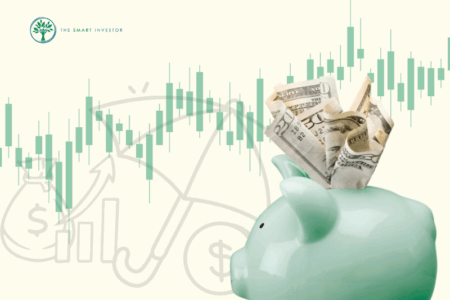Investors went through a turbulent 2020 as the pandemic disrupted supply chains and severely crimped demand for goods and services.
As the business landscape got badly hit, all eyes were on the banks as they represented the pillars of the economy.
Of the three big local banks, DBS Group Holdings Ltd (SGX: D05) was the first to report its full-year 2020 earnings.
Predictably, the bank’s numbers were impacted by significant allowances made in light of the crisis.
However, there was a silver lining to the earnings as CEO Piyush Gupta identified areas for growth this year.
Here are five aspects to take note of in DBS’ latest earnings report.
1. Declining net interest margin
A bank’s net interest margin (NIM) is the difference between the interest rate it pays on its deposit base and the interest it charges on loans that it makes.
DBS’ NIM has plunged sharply from 1.86% in the fourth quarter of 2019 to 1.49% in the fourth quarter of 2020.
The decline was in line with the lowering of global interest rates to boost many battered economies around the world.
However, the drop was just 0.04 percentage points from the 1.53% logged in the third quarter, suggesting that the decrease is moderating.
On a full-year 2020 basis, NIM fell from 1.89% to 1.62%.
Offsetting this decline was a slight uptick in the bank’s loan book.
Customer loans rose 4% year on year from S$357.9 billion in 2019 to S$371.2 billion in 2020.
Despite an increase in loans, DBS’ net interest income still saw a 6% year on year decline to S$9.1 billion for 2020.
2. A jump in non-interest income
The good news is that a jump in non-interest income helped to offset the decline in net interest income.
Net fee and commission income remained flat year on year for the full year at S$3.1 billion.
DBS recorded an increase in wealth management fees to a record S$1.4 billion and higher brokerage commissions associated with more new digital account openings.
However, the above was offset by lower card and investment banking fees as economic activity slowed in line with the pandemic.
Other non-interest income saw a 32% year on year surge to S$2.46 billion, driven by gains in investment securities of S$963 million.
Treasury income also hit a new record high.
Together, this strong performance helped to make up for the decline in net interest income, leaving total income flat for the year at S$14.6 billion.
3. Ballooning allowances
Like most banks, DBS had to make additional allowances for potential bad loans.
To be sure, its profit before allowances would have been a record high, up 2% year on year to S$8.4 billion.
However, full-year allowances ballooned to around S$3.1 billion, sharply higher than the S$703 million recorded a year ago.
Of this amount, S$577 million was set aside in the fourth quarter of 2020, close to five times the level during the same period last year.
The higher level of allowances can be attributed to prudence on the part of the bank as it adopted a conservative stance for its specific provisions for exiting non-performing assets.
The general provisions made were also in excess of regulatory requirements, and were passed through despite the bank witnessing improving macroeconomic conditions.
This level of conservatism should serve investors well as the bank remains cautious due to the evolving nature of the pandemic.
4. Boosting its India presence
Last year’s much-talked-about acquisition of Lakshmi Vilas Bank (LVB) in India helped to add 563 branches and 974 ATMs to DBS India’s existing network in the country.
At the same time, the addition of LVB also added more than two million retail and 125,000 non-retail customers.
LVB’s presence is largely in South India, which has a higher GDP per capita compared to India’s national average.
The bank has revealed its planned strategy for LVB, which is to overlay its digital capabilities with LVB’s customer base to accelerate business development.
There are ambitious plans to build up the division’s current and savings account balances by scaling up in urban areas and cross-selling of personal loans.
Asset-backed lending to small and medium businesses will be scaled up, while LVB’s affluent segment will be served by DBS Treasures.
For now, the jury is still out as to whether this acquisition will be a boon or bane for the bank.
Investors should monitor DBS India’s developments closely in the next few quarters to see if there is any traction gained by the acquisition.
5. Steady dividends
For the final quarter of 2020, DBS has declared a dividend of S$0.18, similar to the level last quarter.
For the full year, dividends amounted to S$0.87, comprising three quarters of S$0.18 each and the first quarter dividend of S$0.33.
Recall that DBS had to cut its dividend and offer a scrip option in line with the Monetary Authority of Singapore’s (MAS) call for banks to moderate their dividend payments to a maximum of 60% of 2019’s level.
The decrease should last for one more quarter, after which the bank may then review its dividend policy again in light of any other updates from MAS.
DBS’ trailing 12-month dividend yield stands at around 3.3% at a share price of around S$26.
Get Smart: New growth platforms
Despite the weaker net profit due to the build-up of allowances, DBS has still identified new platforms for growth in 2021 and beyond.
Apart from LVB, the bank also has a joint venture to set up DBS securities in China to provide onshore products and services to clients.
Beyond that, the bank is also setting up a digital exchange with approval from MAS to issue and trade in digital tokens and offer exchange services for popular cryptocurrencies.
DBS certainly had to take its lumps in 2020, like any other bank.
But as we look ahead, there are interesting developments in 2021 that could boost the bank’s profitability.
10 Growth Stocks To Supercharge Your Portfolio! In our latest special FREE report, we cover 3 unstoppable growth trends and the 10 stocks that will ride them in 2021 and beyond! CLICK HERE to download now!
Follow us on Facebook and Telegram for the latest investing news and analyses!
Disclaimer: Chin Hui Leong owns shares in DBS Group Holdings Ltd.




